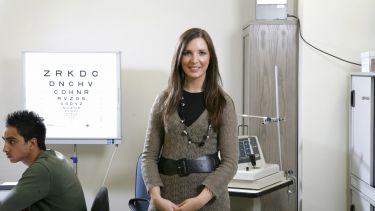Orthoptics with Foundation Year BMedSci

Foundation year
The foundation year of the programme provides students with non-standard entry qualifications, a thorough and supportive academic preparation for successful degree-level study in the School of Allied Health Professions, Nursing and Midwifery.
On successful completion of the foundation year, you will progress to Orthoptics BMedSci.
Entry requirements
As well as meeting the standard Foundation Year eligibility requirements, applicants to this programme must hold a recent (within the last five years) GCSE grade C/4 (or equivalent) in maths and English language.
Applicants will also be asked to demonstrate relevant work or volunteering experience. We advise applicants to contact their local orthoptic department and request the opportunity to observe the work of an orthoptist, although we will also consider voluntary or paid work experience with children, the elderly, or people with disabilities.
During the three years of study (following the foundation year) students obtain clinical experience by going on block (usually four weeks) clinical placements at hospitals across the United Kingdom.
Students must sign an entry agreement prior to commencing the degree, so that they are willing to go on placements chosen by the department anywhere in the UK.
Applicants will be required to complete a DBS check before entry to level 1 of this course. The Orthoptics BMedSci course page includes further entry requirement information.
Programme length
Foundation Year: One year full time.
Levels 1-3: Three years full time in the School of Allied Health Professions, Nursing and Midwifery.
Progression to School of Allied Health Professions, Nursing and Midwifery
You will progress to the School of Allied Health Professions, Nursing and Midwifery after completing your foundation year, subject to meeting progression thresholds, which differ across courses and departments. These will be discussed with applicants at interview.
Health clearance
All new students must obtain occupational health clearance, which may require an individual assessment. This is to ensure that you meet the fitness-to-practice standards detailed in the Higher Education Occupational Practitioners (HEOPS) guidance.
We offer support to students with additional needs, for example, through the Disability and Dyslexia Support Service and Student and Academic Services. You can find out more about the network of support services we provide.
A very small number of conditions might, on health and safety grounds, affect your registration with the appropriate regulatory body and your ability to practise in certain clinical situations.
If you're offered a place, you'll need to comply with the Department of Health and Social Care mandatory immunisation requirements.
You should have at least two Covid vaccinations to protect yourself and vulnerable people in your placement areas.
